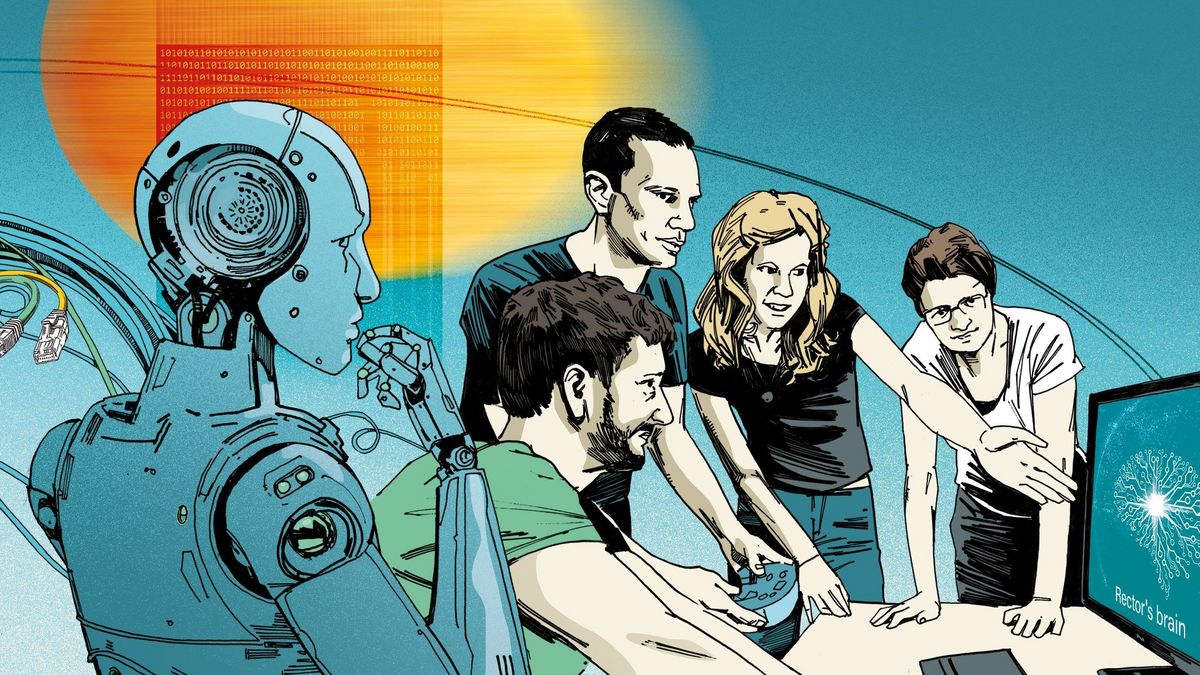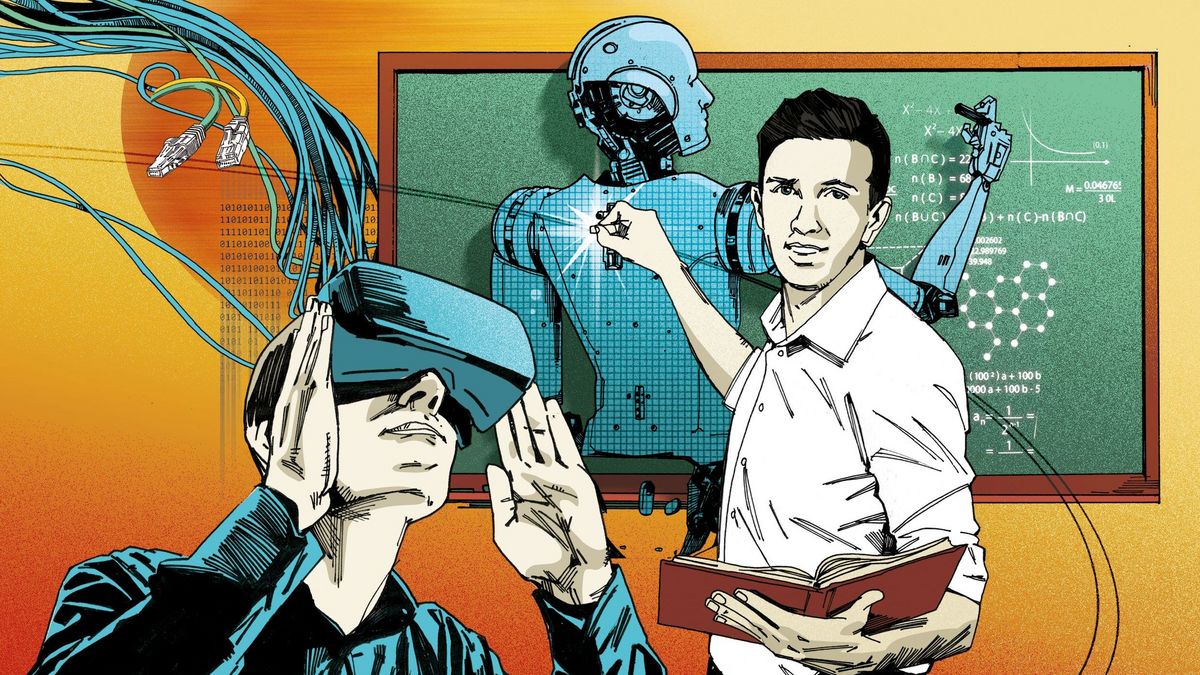In cooperation with non-university research institutions and partners from industry and public administration, Leipzig University has founded an initiative to establish an efficient AI infrastructure for research, teaching and transfer in the Central German region.
Together with non-university research institutions and cooperation partners from business and administration the Leipzig University is planning to establish an AI Data Centre for Leipzig as a business and science location. The AI Data Centre Leipzig will provide at least 1.000 m² of usable space for server infrastructures and will be designed for an IT capacity of at least 3 megawatts (MW). It represents an urgently needed regional infrastructure for three areas of use:
- method development for artificial intelligence research,
- application-oriented cooperation projects between industry and science in the AI field, and
- Training of IT specialists and AI experts.
The project is in line with the German government’s artificial intelligence strategy and directly follows the Saxon state government's recommendations for action to implement the Structural Strengthening Law.
The AI Data Centre Leipzig will shape the future image of the Central German Mining District and will contribute significantly to successful structural change. In addition to securing and creating highly qualified training and jobs, deepening value chains and tapping new value creation potential, the project will drive the broad establishment of the key technology of artificial intelligence in the region. This will make an important contribution to positive economic and demographic development.
Through its potency and structural effects, the AI Data Centre Leipzig will become a milestone in the development of Leipzig as a science and business location. A project that links the scientific environment and the regional economy in the context of research, teaching, training and transfer in this breadth and depth and generates synergies, competitive advantages and value creation potentials is unique in Saxony. Also, it will have a model effect throughout whole Germany.
Project description
Together with non-university research institutions and cooperation partners from industry and public administration, Leipzig University has founded an initiative to establish a powerful AI infrastructure for research, teaching and transfer in the Central German region. At the centre is the establishment of the KI Data Centre Leipzig (KIRZL). It addresses the needs of cutting-edge research and business applications and creates the prerequisites for three areas of use by providing an urgently needed local infrastructure:
- method development for research into artificial intelligence (AI) and further development of basic research through the use of AI methods,
- application-oriented cooperation projects between industry and science on AI in numerous areas - in particular medicine and e-health, biotechnology and life science, energy and environmental technology, logistics and smart city, IT and e-commerce, automotive and supplier industry, media, and creative industries and
- training and further education of IT specialists and AI experts.
The project thus directly follows the Saxon state government's recommendations for action to implement the Structural Strengthening Act: The AI Data Centre uses Leipzig‛s charisma and strengthens the Central German Mining District as a research and development location, intensifies cooperation between science and industry, promotes application-oriented education and supports measures to promote the intensity of start-ups. It thus makes a significant contribution to the successful structural transformation of the Central German Mining District, which is described in the vision of the future as a leading innovation hub, attractive business location and pioneer of digitization.
At the same time, the project picks up on the guiding principles of the German government's artificial intelligence strategy: “to establish internationally visible research structures and, in particular, to provide state-of-the-art AI and computing infrastructures at an internationally competitive level,” “to establish AI ecosystems of international appeal based on excellent research and transfer structures in order to accelerate the application of research results in business practice, especially in SMEs and to boost start-up dynamics,” and “to train, recruit and retain more AI specialists in Germany.”
The Leipzig science region – with its internationally recognized universities and non-university research institutions – has a very high research density and therefore optimal conditions for the project. However, the consistent development and use of the potential of increasingly data-based and AI-driven research is significant for maintaining and strengthening competitiveness. Prospectively, data scientists, AI and IT experts will be needed who are closely networked with the scientific institutions and companies in the region and support the identification of promising application scenarios as well as the application, adaptation, and development of innovative AI methods. For example, development cycles in pharmaceutical research can be significantly shortened, conclusions for the development of regenerative energy systems can be derived from research on climate change, and impulses for smart city applications can be generated from research in the humanities and social sciences.
A unique selling point of the KIRZL is that it enables and promotes new, cross-organizational collaborations of regional actors from science, business, and administration. KIRZL provides capacities, infrastructures, as well as data, information and consulting services for the development and application of AI processes and products and ensures the highest security standards for the protection of sensitive data and algorithms. Users of the infrastructure available on site are universities, research institutions, public authorities, regional companies, and start-ups. KIRZL is a regional innovation hub at the interface of science and business, where experts and users can exchange information on AI-based analysis methods, techniques, and services, implement innovative projects, and open up new application areas in the field of AI.
1. magnet for cutting-edge research in a key technology of the future
The KIRZL creates infrastructural and organizational conditions in Leipzig for cutting-edge research on artificial intelligence. This includes cooperation projects with industry and administration. The Leipzig strategy pursues the goal of promoting the application of AI processes in all areas of the natural sciences, life sciences, humanities, and social sciences and of introducing emerging questions into basic AI research. To this end, the data centre provides extensive capabilities for the acquisition, integration, storage, aggregation, collaborative processing, and analysis of very large data sets. Training of intelligent algorithms is performed on the base of these local data sets and specialized computing systems, which are continuously adapted to the state of the art in AI research and technology. Services for quality assurance, evaluation and publication of datasets, and algorithms support the research work and substantiate its application and exploitation. In this way, KIRZL makes an essential contribution to the excellence strategy of Leipzig University and helps to attract international experts. At the same time, the research activities at KIRZL will have an impact on the entire scientific landscape in the region, initiate cooperation between science and industry, and contribute to the development of new research fields. In addition to the high performance IT infrastructure, the easy and interdisciplinary cooperation, the demand-oriented education, and training of IT specialists and AI experts, as well as the flexible adaptation of the computing resources to the investigated problems, will have a positive impact.
2. innovation platform for application-oriented cooperation projects between industry and science
The KIRZL aims at a broad application of AI processes and methods because AI methods have an impact on all research and economic areas. The cooperative work will initiate, intensify, and sustainably strengthen new structures and linkages between science, business, and public administration. In this context, the AI Data Centre acts as a regional innovation platform for AI-driven business models and supports the development of value creation potential and the establishment of new economic AI value chains through technological impulses from research. By providing capacities for training intelligent algorithms, regional data repositories (e.g. Urban Data Platform of the City of Leipzig or medical data repositories) and AI infrastructures for qualification measures and transfer formats (test and real labs) KIRZL supports data-driven and AI-based start-up projects and start-ups in the region. With this, KIRZL will support the initiation and implementation of interdisciplinary projects with high economic and social relevance, as the importance of artificial intelligence is rapidly increasing in many areas of life.
The organizational structures of the KIRZL will enable easy participation of commercial enterprises, start-ups, and public authorities. This will be done especially through close cooperation with the national AI competence centre “ScaDS.AI Dresden/Leipzig”, the transfer initiative “AI Hub Saxony”, the BMWi Digital Hub “Smart Infrastructure Hub Leipzig”, as well as start-up initiatives and transfer institutions. With the establishment of the AI Data Centre Leipzig an innovative economic ecosystem with high charisma is created in the region.
3. infrastructure and “place” for the training and networking of IT specialists and AI experts
The KIRZL strengthens the attractiveness of the location for companies through the offer of education and training in artificial intelligence techniques and methods. All teaching departments of Leipzig University and the cooperating science partners can access the innovative infrastructures and IT services of the KIRZL for teaching and research. Researchers and students can gain extensive experience in the application of AI methods in their departments directly on site. AI experts advise companies and public authorities and teach methodological basics and novel AI technologies. In this way, KIRZL makes a significant contribution to ensuring that the necessary specialists are available, that the Leipzig economic region becomes more competitive (nationally and internationally), and that a large number of new jobs are created.
In view of existing capacity bottlenecks, the stagnating share of highly qualified workers in Central German and the resulting structural disadvantages of this rapid implementation of KIRZL is crucial.
The AI Data Centre Leipzig will provide at least 1.000 m² of usable space for server infrastructures and will be designed for an IT capacity of at least 3 megawatts (MW). In order to be able to meet regional requirements in the highly dynamic AI environment a scalable concept will be pursued: The design will enable the Leipzig AI Data Centre to be expanded in terms of electrotechnology, air-conditioning and security, and to be adapted to meet increasing requirements in the future.
The planning, construction, and commissioning of KIRZL is scheduled for the period 2022-2026. After completion of the data centre building in 2025 the commissioning of the AI cluster will take place in 2026. This will include the associated components for cloud, storage, backup, archive, and network infrastructure.
The City of Leipzig and Stadtwerke Leipzig are supporting the University in exploring suitable locations. In addition to certification-relevant requirements, sustainable energy supply, energy-efficient air-conditioning concepts, and the ecologically sustainable use of waste heat are key criteria in the selection of suitable locations. For the later operation a collaboration with Stadtwerke Leipzig is planned. The partnership will include the use of waste heat in connected local and possibly district heating networks.
The investment costs for the entire project amount to 46 million euros.







